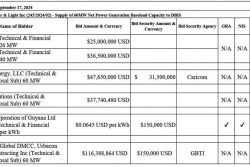Education Minister Shaik Baksh is appealing to secondary school students, particularly males, who are awaiting their Caribbean Secondary Education Certificate (CSEC) results to join the teaching profession, if they perform well, the Education Ministry said in a press release on Tuesday.
Meanwhile, the ministry in the last week before school closed had been circulating brochures to all secondary schools encouraging the departing Fifth Form students to join the profession. The CSEC results are expected to be available by August month-end.
Baksh, speaking at a recent forum, lamented the limited number of male teachers in the school system, and said measures will be put in place to make the profession more attractive to males.
Given the occasional unsatisfactory behaviour of students, among other issues, educators are becoming increasingly aware of the need for the presence of more male teachers in the school system to serve as positive role models to boys, and to reverse their underachievement, the release stated.
It observed that generally it seemed that men are opting out of teaching primarily because it is seen as a low paying job, among other reasons.
This situation is not unique to any one country, the release added, and many have made attempts to narrow the gender disparity in the teaching profession.
Similarly, Guyana is following suit, and the recruitment drive aims to change this growing phenomenon that exists at all levels of the education system.
Although there are concerns over the poor number of males in the profession locally, it was encouraging to note that a male, Villon Paris, emerged as the best graduating teacher at the recent Cyril Potter College of Education (CPCE) graduation exercise.
According to data from the ministry’s 2008-2009 Statistic Digest the ratio of male to female teachers in the education system is 1:247 at the nursery level; 1:7 at the primary levels; and 1:2 at the secondary level.
These figures in comparison with other countries are not vastly different, and generally reflect a world-wide trend.
Notably, according to Martin and Marsh (2006), in England, males comprise 16 per cent of teachers at primary schools; in Scotland, seven per cent (2003); the U.S., 22 per cent (2003); and New Zeeland, 18 per cent (2005).
The UNESCO Institute for Statistics puts the figures in Belize at 28 per cent (2005) and El Salvador at 30 per cent (2005); while Tran Quynh Hoa in 2008, indicated that there was also 30 per cent of male teachers at the primary level in Vietnam.
Apart from the drive to encourage more males into the profession, the government has also been making continuous efforts to improve the working conditions and welfare of teachers, the release stated.
Teachers today enjoy uniform allowance, a salary increase for upgrading their qualification, those from the coastland performing duties in certain areas in the hinterland regions receive an additional $30,000 housing allowance along with other allowances, while a limited number of teachers annually receive scholarships to further their studies at the University of Guyana (UG).





